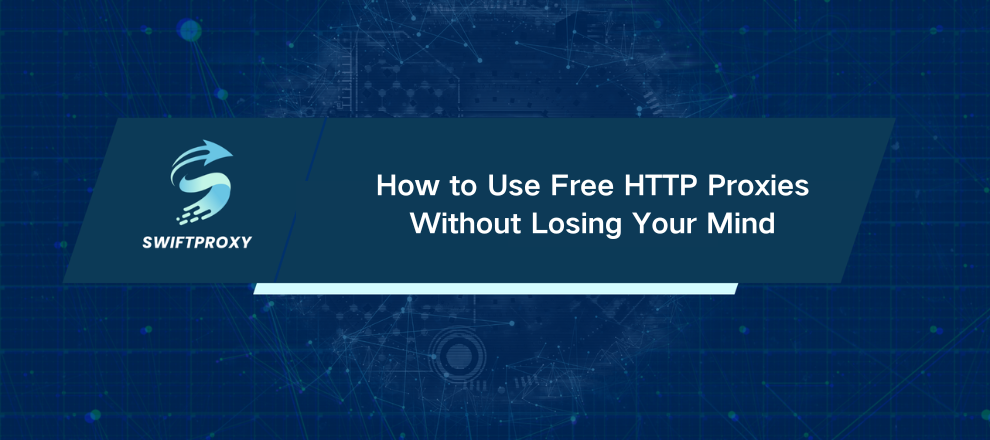How to Use Free HTTP Proxies Without Losing Your Mind

Imagine surfing the web without anyone knowing who you are—or even where you are. That's the promise of free proxies. They let you peek behind geo-blocks, access restricted content, and keep your online identity under wraps. Sounds great, right? But there's a catch. Free proxies often come with slow speeds, weak security, and zero customer support. Use them blindly, and you might be opening a door you didn't intend to.
This guide is your map. We'll show you what free proxies are, the different types available, safe ways to use them, and the pitfalls you need to avoid. After reading this, you'll know exactly when a free proxy makes sense—and when it doesn't.
What Exactly Are Free Proxies
At their core, free proxies are middlemen between your device and the internet. Your requests go through them before reaching the website you want to access. They hide your real IP address, which can keep your browsing private. People use them to bypass geo-restrictions, access blocked content, or just experiment online without revealing their identity.
These proxies can be HTTP or SOCKS5. You can find free HTTP proxies in online lists, ready to plug into any program that supports the right protocol. However, the ease of access comes with certain trade-offs.
Key Features of Free Proxies:
Anonymity: They mask your IP, making tracking more difficult.
Access: Reach websites and content blocked in your region.
Availability: Hundreds of proxies are out there, often just a click away.
Different Types of Free Proxies
Not all proxies are created equal. Knowing the difference can save you a headache:
HTTP Proxies: Good for standard web browsing. Simple, fast—but limited security.
HTTPS Proxies: Encrypt your connection for safer browsing. Better for protecting passwords and sensitive info.
SOCKS5 Proxies: High anonymity, versatile, and works with various apps. Great for testing and data gathering.
Transparent Proxies: Reveal your IP and mainly used for caching or filtering content. Not for privacy.
Public Proxies: Free and open for anyone. Convenience comes with risk.
Paid Proxies: Faster, more secure, and reliable. Worth it if safety and speed matter.
When Free Proxies Make Sense
Use free proxies wisely. They are perfect for low-risk tasks:
Browsing geo-restricted websites.
Testing tools or websites without signing up.
Checking content availability across regions.
They are not for sensitive operations. Avoid logging into banking accounts, submitting personal info, or transferring files containing confidential data.
Discovering Reliable Free Proxy Lists
A proxy list is a directory of available free proxies with their IP, port, and protocol. Some lists even show the country, making it easy to pick a location. But beware—many lists include proxies that are slow, dead, or unsafe.
Tips for Reliability:
Choose sources that update regularly.
Look for HTTPS or SOCKS5 proxies for better security.
Test proxies before relying on them.
Free SOCKS5 Proxies
SOCKS5 proxies offer stronger anonymity and work across multiple protocols. They're a step up from HTTP proxies but still come with speed and stability issues if free. Always test them before relying on them for any critical tasks.
Free vs. Paid Proxies
The difference is night and day:
Free Proxies: No cost, but slow, unstable, and potentially unsafe.
Paid Proxies: Fast, reliable, secure, and backed by support.
Use free proxies for low-risk browsing and testing. Switch to paid if performance, encryption, or uptime is essential.
Risks of Free Proxies
Free proxies carry real dangers:
They can host malware or phishing attempts.
Many log your activity and sell it to third parties.
Weak encryption can expose your data.
Always verify safety before use. A proxy-checking tool can save you from a nasty surprise.
How to Use Free Proxies Safely
Pick the Right Proxy: Focus on HTTPS or SOCKS5.
Test Performance: Speed and reliability matter.
Avoid Sensitive Data: Never enter passwords or financial info.
Update Regularly: Remove dead or slow proxies from your list.
Stick to Low-Risk Tasks: Casual browsing, content checking, or testing is fine.
The Bottom Line
Free proxies can be fun and useful, but only if you know their limits. They're best for casual browsing, testing, and accessing geo-restricted content. Anything more sensitive? Invest in a paid solution. Use them wisely, test them consistently, and you can enjoy the perks without unnecessary risk.

















































